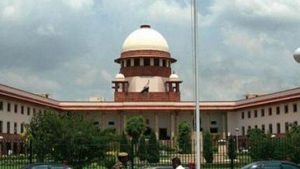 NewDelhi: The Supreme Court on Friday sought the response of the Centre on PILs seeking direction to declare unconstitutional the Unlawful Activities (Prevention) Amendment Act, 2019, that confers power upon the Central government to designate an individual as a terrorist. A bench comprising of Chief Justice Ranjan Gogoi and Justice Ashok Bhushan while agreeing to examine the matter issued a notice to the Centre. The court was hearing two PILs filed by an NGO and a Delhi resident Sajal Awasthi.
NewDelhi: The Supreme Court on Friday sought the response of the Centre on PILs seeking direction to declare unconstitutional the Unlawful Activities (Prevention) Amendment Act, 2019, that confers power upon the Central government to designate an individual as a terrorist. A bench comprising of Chief Justice Ranjan Gogoi and Justice Ashok Bhushan while agreeing to examine the matter issued a notice to the Centre. The court was hearing two PILs filed by an NGO and a Delhi resident Sajal Awasthi.
The pleas challenged the constitutional validity of Section 35 and Section 36 of the UAPA that paved the way for the government to notify an individual as a terrorist. The NGO cited the lifelong stigma attached to a person notified as terrorist even after being denotified.
The plea also sought direction to declare the UAPA violative of Fundamental Rights as enshrined under Article 14 (Right to Equality), Article 19 (Right to Free Speech and Expression) and Article 21 (Right to Life) of the Constitution of India. The petition filed by Awasthi had stated that the recent amendment allows notification of “individuals as terrorists” while under UAPA, 1967, only organisations could be notified.
The UAPA 2019 has modified Chapter VI of the Unlawful Activities (Prevention) Act, 1967 along with Section 35 and 36, it added. Section 35 of UAPA 2019 does not specify detailed grounds or reasons based on which an individual can be termed as a terrorist, said the plea, adding that conferring of such an “arbitrary and unfettered power without any limits or bounds” amounts to a violation of Article 14 of the Constitution of India.
Awasthi`s petition stated, “The new or amended Section 35 of the UAPA Act, 1967 empowers the Central government to categorise any individual as a terrorist and add the name of such a person in Schedule 4 of the Act. Conferring of such a discretionary, unfettered and unbound powers upon the Central government is an antithesis to Article 14 of the Constitution of India.”
The amendments in UAPA, 2019 empower the ruling government, under the garb of curbing terrorism, to impose an indirect restriction on the right of dissent which is detrimental for our developing democratic society, the plea said. It added that the UAPA, 2019 “does not afford an opportunity to an individual, being categorised as a terrorist, to present his/her case and let such individuals live on the whim and caprice of the society thereinafter”.
The amended Section 35 of the UAPA, 1967 “directly and adversely affects the Fundamental Right to free speech and expression” as enshrined under Article 19 (1) (a) of the Constitution of India. Right of dissent is a part and parcel of Fundamental Right to free speech and expression and therefore, cannot be abridged in any circumstances except for mentioned in Article 19 (2), it further said.
The petition had also stated that UAPA, 2019 also violates the right to reputation — an integral part of the right to life, by terming or tagging an individual as terrorist even before the commencement of trial. In August, President Ram Nath Kovind gave assent to the legislation under which individuals can be declared as terrorists, their properties seized, and that put travel ban on such individuals.
Leave a Reply